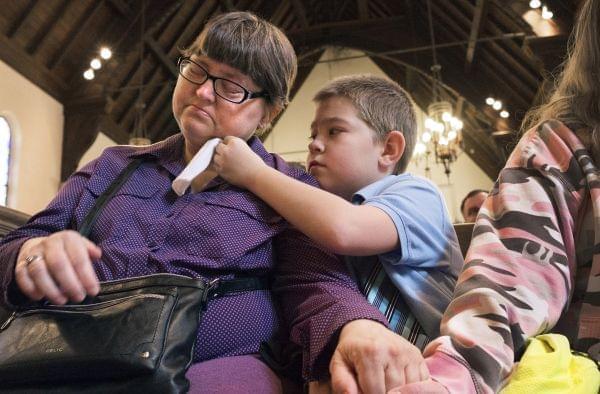Adams Co. Coroner To Poor: Pay $1000 Or County Keeps Remains

Nicholas Weible, offers his mom, Wendy Smith a tissue during the memorial service for his father, Christopher Weible, held at First Christian Church in Quincy, on April 20. Adams County Coroner James Keller is facing sharp criticism for how he handles poor people who can't afford to bury their loved ones: He has them sign over their rights to the deceased, leaving them without the death certificate, then cremates the body and keeps the ashes until the family pays $1,000. After Weible died last month, his family held a memorial service with just a photograph and an empty container. Weible and his ex-wife, Wendy were both on disability and she didn't have $1,000 to get his ashes. Steve Bohnstedt/via AP
Adams County Coroner James Keller is facing sharp criticism for how he handles poor people who can't afford to bury their loved ones: He has them sign over their rights to the deceased, leaving them without the death certificate, then cremates the body and keeps the ashes until the family pays $1,000.
If they cannot come up with the money, the ashes are eventually buried, along with others, in an unmarked grave. If the family needs the death certificate to access bank accounts or life insurance, the coroner first arranges for the county to recoup its costs from any proceeds.
Keller says the policy started after the state, which for years has faced billion-dollar deficits and unpaid bills, announced it was too broke to pay for indigent funerals and burials — shifting the cost to funeral homes and county coroners. Of the $1,000 people pay, he says $800 goes to the funeral homes and $200 to the crematory.
Adams County’s poverty rate of 13 percent is on par with the overall rate in Illinois. Keller says his approach protects taxpayers in the small county along the Mississippi River, ensures local funeral homes get money for their services and gives poor families an alternative to paying for a full burial. He's continued the policy even though the state has resumed paying for the funerals.
"We do our very best and our due diligence to taxpayers, and we try to be supportive of families, with the hand that we're dealt with by the state," Keller said.
Some residents are trying to change the policy, saying it amounts to the coroner's office holding ashes hostage and creates a financial crisis for grieving relatives already struggling to pay for basic necessities.
"I felt like it was a kidnapping. He was being held against his will," said Tom McElroy, whose brother, Mark, died last year with nothing more than the $200 in his wallet.
After Chris Weible died last month, his family held a memorial service at a Quincy church with just a photograph and an empty container. Weible and his ex-wife, Wendy Smith, who had three children together, were both on disability.
"I just think they pick on the people that are poor," Smith said.
How to pay for indigent burials is a question that has stymied other counties and states. More than a dozen states provide money to cover the costs, though several — from Indiana to West Virginia — say their funds haven't been enough to meet demands.
Illinois provides up to $1,655 — $1,103 for funerals and $552 for cremation and burial. But the money was cut off in 2010 and again in 2015 as the state headed into a more than two-year budget impasse. In some cases, counties ended up picking up the costs.
Rod Cookson, co-owner of Zehender Robinson Stormer Cookson Funeral Home in Quincy, said at one point the state owed his business about $20,000. Cookson said he didn't know the Legislature restored the funding.
"They're bankrupt," he said of the state.
He's not the only funeral home director who's either unaware that funding is available again or has given up on the state. Though lawmakers appropriated $9.3 million this year — the same amount as the 2015 budget year — the number of claims has plummeted, from 5,652 in the 2015 budget year to 1,084 so far this fiscal year, which ends June 30.
Cookson likes Keller's program and said and it's not right that some are making him out to be "next to the devil." While some places such as Chicago's Cook County pay for indigent burials, in other counties poor residents must call around to funeral homes until they find one that will help.
"These people that don't have any money are very, very lucky to live in Adams County," Cookson said.
Keller also works as a funeral director, but he insists his decision to create the policy was unrelated to his other job.
He says he had 90 inquiries about indigent burials last year. He says he asks families multiple times if they're sure they want to sign over their loved one's body, and gives them time to change their minds. He says he doesn't give them the death certificate or ashes to protect against "abuse," such as a case in which he later learned a family that didn't want to pay for burial had received life insurance.
Smith has a different version of events. She says she was unclear about what the form she was signing would do, and that she asked Keller if he could work with her to make payments toward the $1,000 and he refused. She also says Keller told her that if she didn't pay, he'd bury the ashes in a cemetery and not reveal the location. He denies that, but several friends and family say they heard Keller make that statement or that he separately told them the same thing.
Smith eventually raised the $1,000 through donations. McElroy's family did the same, but it took months.
"He could've died in prison and been better off," Tom McElroy said. "He deserved better."
